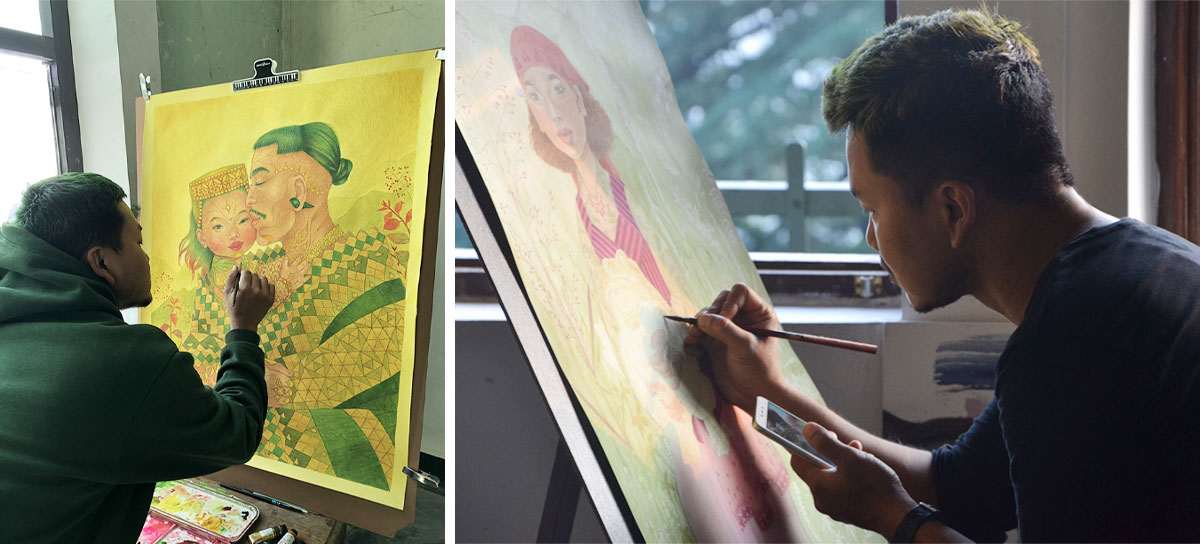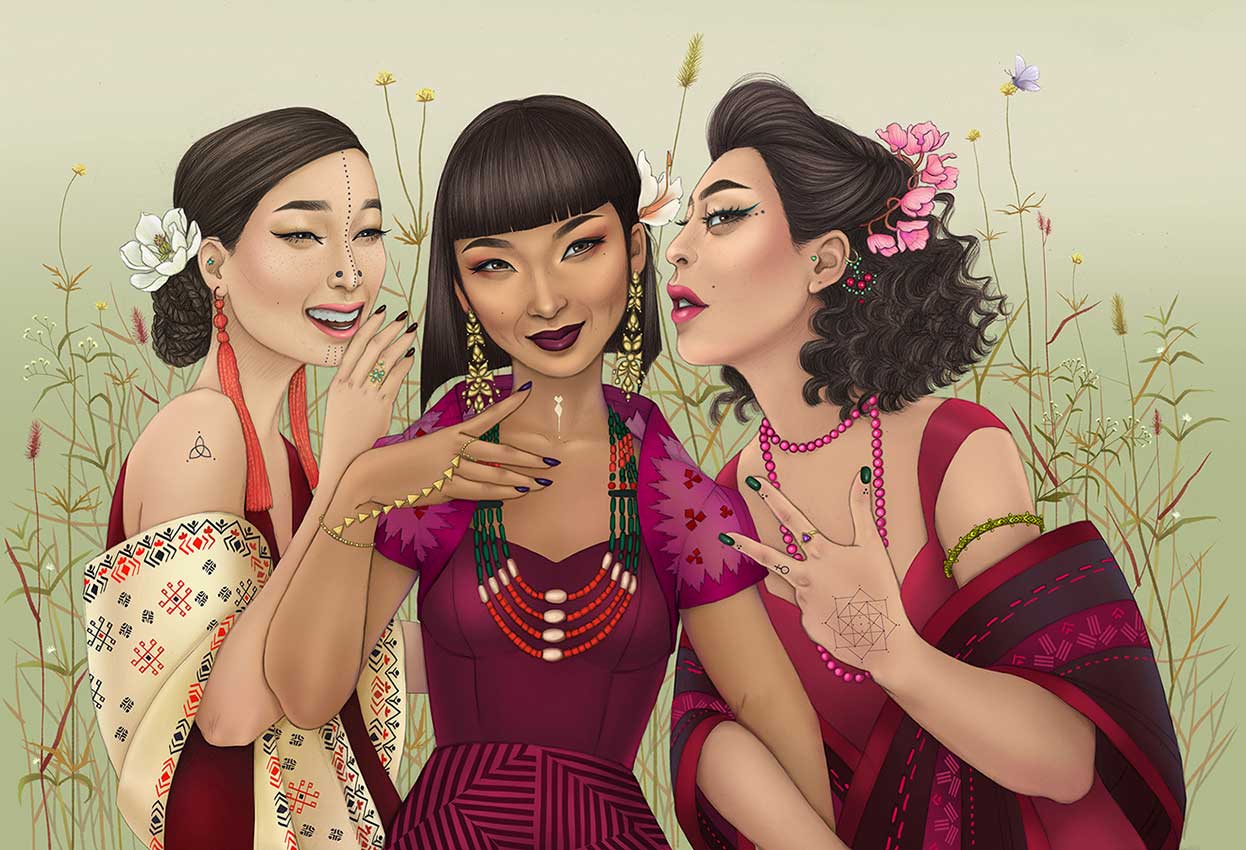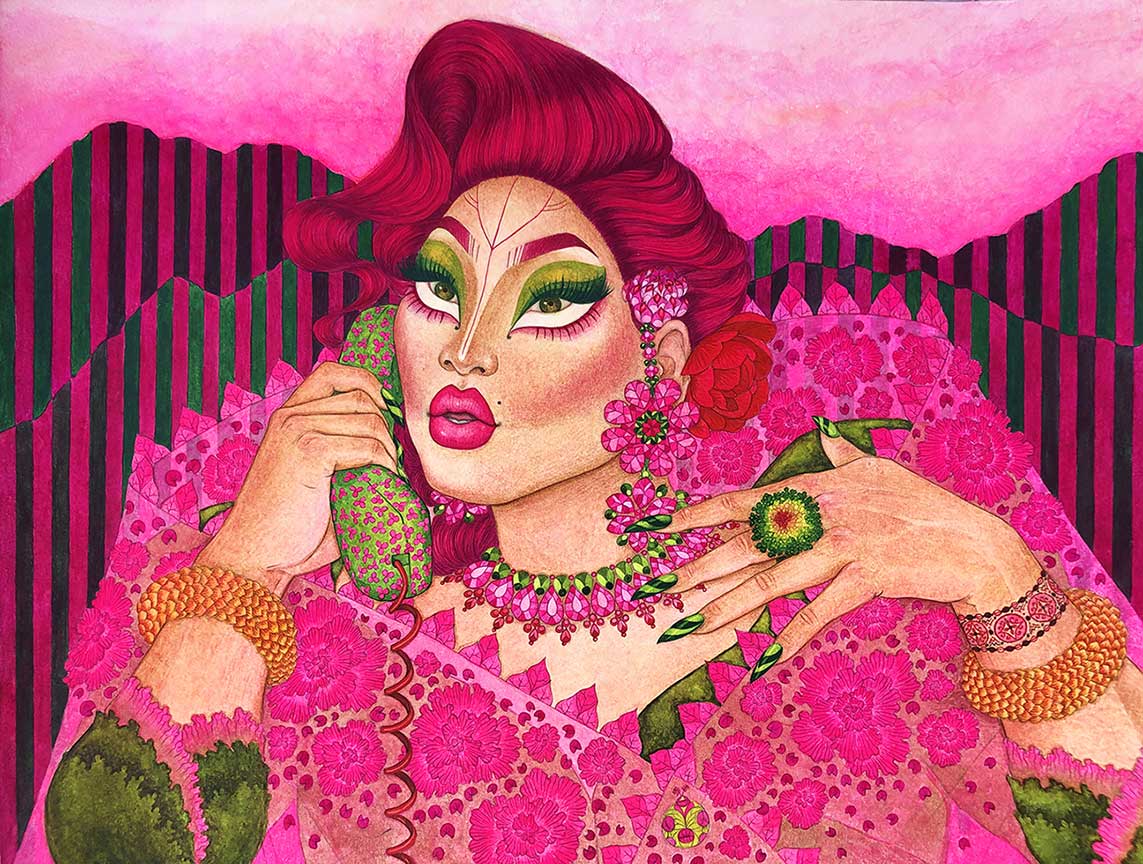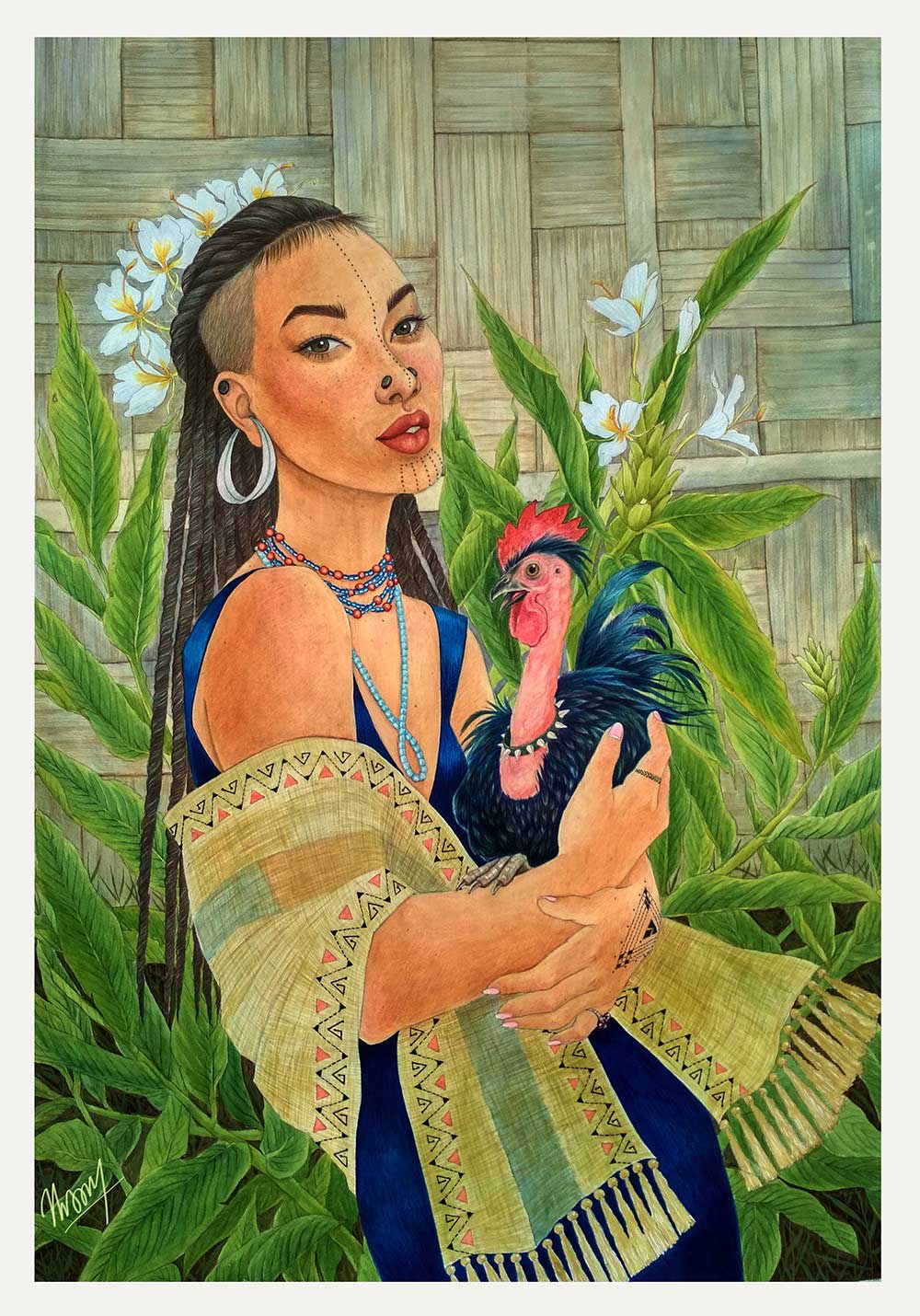
There is a touch of the burlesque in Thokchom Sony’s art. His subjects are colourful, extravagant, humorous, incredibly stylish and yet there’s something unsettling about them. They wear vividly coloured, beautifully designed clothes, have elaborate hairdos and strike bold, exaggerated poses, but their eyes look serious. On a closer look, even sad. And if you speak to Thokchom, you will understand why. Three things occupy the visual artist’s mind – nature, fashion and mental health. An odd combination indeed, but they all come together rather strikingly in his work.
Growing up as a child in Manipur, Thokchom was surrounded by nature in all its glory. He observed how tribals, in their symbiotic relationship with the forests, had a deep and spiritual understanding of life. They seemed at peace with themselves. He contrasted that with the city, where he went to study art. Life was fast and exhausting and there was widespread loneliness and depression. And each time he went back home, he realized the countryside had a way of healing the body and soul.
Thokchom’s art is inspired by what he describes as the geometric designs in nature. Northeast India’s rich biodiversity is a perfect example of a master plan, a fine balance from which humans have much to learn. Ethnic cultures and contemporary fashion excite him in equal measure. Manipur’s rich textile tradition and the people’s innate sense of fashion find ‘visual voice’ in his work. Thokchom uses both the traditional (watercolour and acrylic ink) and the digital medium in his execution and even though his subjects are so obviously rooted in the culture of his birth, there’s a certain universality about them. That is because he believes every culture, though unique, contributes in making us whole and that is why his work has had an enthusiastic audience in Imphal, New Delhi, Mussoorie and the United Kingdom.

It was during the pandemic in 2020 that Thokchom started paying closer attention to issues of mental health. While big-city loneliness was something that had struck him when he went to study Fine Arts in New Delhi’s Jamia Millia Islamia University, he noticed the effect that the isolation of the national lockdown had on mental health, even among family members. He felt the need to do something about it through his art. He involved himself in the Art for Change Foundation because he believed that in expressing his feelings through his work, he would be able to reach out to those in distress. Art, like nature, has the power to heal, he says. It brings hope. It can even bring about change.
In this interview with The NorthEast Stories, Thokchom speaks to us about a range of issues, including what inspired him visually as a child, his determination to be an artist and his early days as a book illustrator. He believes the world is only just opening up to art from the Northeast. Young artists from the region no longer have to rely on the patronage of museums and art galleries. The internet has levelled that playing field. This generation is confident about following their dreams, he says. There’s an art revolution brewing here.
What was your artistic journey like? Did you always know you wanted to paint?
Ever since childhood I have always loved drawing and painting. None of my parents are into fine art, but I remember my mother used to weave clothes on the loom. She used to create floral patterns on the weave. As a child my cousin brother and I used to look up to our cousin sister who is older than us. She introduced us to new games, crafts and art which she learnt from school. She inspired me to create narrative story panels as a kid. I remember spending time alone in the morning drawing, letting my creative ideas flow. Like every Indian parent, my parents wanted me to opt for engineering but I resisted and came to Delhi to join art college. In the beginning I used to work as an illustrator and have worked on children’s books and war comics. In 2015, I started painting my own ideas and narrative and it has been a journey of self-discovery, learning about myself and my identity.

Three friends
What experiences shaped your art? (Perhaps, your upbringing, your studies, your peer group, someone you admire). Tell us about your life in Manipur. When did you move to Delhi?
I grew up in Singjamei, (a residential colony dotted with quaint local bazaars) in the West of Imphal. I was naïve, inexperienced and was not aware of the beauty and richness of home in my early life. The realisation and appreciation came to me only while living in the city. I believe one has to be out of our comfort zone and experience freedom in order to find ourselves and our true potentials. The artworks that we create are a reflection and expression of our inner being.
I came to New Delhi in 2007 to start my career in fine arts, right after completing my high school examination. Initially I experienced a culture shock.
Everything in the city was overstimulating, but I gradually got used to the fast life and enjoyed the multi-cultural exposure. Living in Delhi, I have experienced life on my own terms. I have rediscovered myself in the city, my identity and a deep feeling of belonging to the north east India. I have met people from different walks of life and have experienced different communities in Delhi. I have met the most authentic personalities and intellectuals who have inspired me in my journey as well.
There is a certain youthfulness to your art that is striking – it blends culture with the cosmopolitan. While there can be a myriad interpretations, what goes on in the artist's (your) mind when giving life to these ideas?
I contemplate while travelling in an auto rickshaw in Delhi or while going for a bicycle ride alone in Manipur. That is the time when my mind starts flowing with wild ideas and I start creating stories in my mind. When I feel the urge to sketch. I put on my favourite music and I start doodling. I don’t have the final output in my mind. The portrait mostly flows out from my subconscious mind and it gets into shape as I gradually add details. If I need some particular details of certain objects, insects or plants I either take pictures or look for references online. I pose myself and set a timer if I don’t have someone around me to capture the body gesture of the subject. I like avant-garde fashion and I like to play around using silhouettes, forms and patterns inspired by the handlooms of Northeast India. I want to bring the stories of the Northeast Indian handloom on a global platform. Another element is the feeling of nostalgia in my work. I still have the heart of a child that makes me keep going on in life.

The Wedding Guest
Does your style seek to express something about the new generation - perhaps revolutionise what defines traditions/culture for you?
I’m in a way documenting the present time and visualising the future, the future we want to see. My idea is to learn from our ancient traditions and cultures but evolve and revolutionise into something everyone could relate to.
Fashion, nature and mental health are some obvious themes in your artwork. How do you relate these three? Would you say they are related?
Nature is so humble yet so avant-garde in its creativity. There is so much wisdom in nature. People who are connected close to nature, especially the tribal have a deeper relationship with the environment and have a deep understanding of the flow of energy in the universe. Nature has the power to heal our mental, physical, and spiritual self. The inspiration of my colour palette, designs, geometry, and fashion comes from nature. Green is my favourite colour since childhood. Seeing greenery around gives me joy and healing. I have lived in the city and the fast life; 9 to 6 workplaces can be really exhausting. Studies have found, cities have the highest rates of mental health problems and have a higher risk of depression. Getting out from the cycle even for a moment and reconnecting to nature can really help I believe. Children love to explore nature, and they learn by using different senses. As an adult sometimes being like a child in nature can do wonders to our body and soul.

My Beloved Tani and Koko
During the ongoing-pandemic, mental health issues were seen like never before - it touched everyone and unlocked a part of our own mental health that we ourselves were unaware of. Did it affect your creativity and thought processes too? If so, how?
The beginning of the pandemic was tough. I was glad I could spend time together with my family back home but there were challenges too like everyone else.
Mental health issues were one of the things that hit me as well, along with my family members. I had participated in a virtual artist programme on mental health organised by Art for Change Foundation. It was a learning experience. We had opened up on the mental health topic like never before in the past. Making art has helped me channelise and express my feelings and it helped others too. Art has the power to heal and bring positivity around.
What do you think about the future of art from North East India? How do you envision it, seeing the new talent out there?
Thanks to the internet and social media, we see a lot of talent rising from the North East India. Earlier the galleries and museums were the only place to showcase one’s creativity and talent ,but right now it is a revolution. There is so much potential and richness in Northeast Indian culture and so much talent out there. In the past, there weren’t so many local professional artists to look up to and we had to fight with our parents and society to choose art as a career; right now it is more accepting, and the new generation is confident about following their dreams. I believe it is just the beginning. I’m looking forward to seeing the change. Art is going to bring hope and changes to our society.

